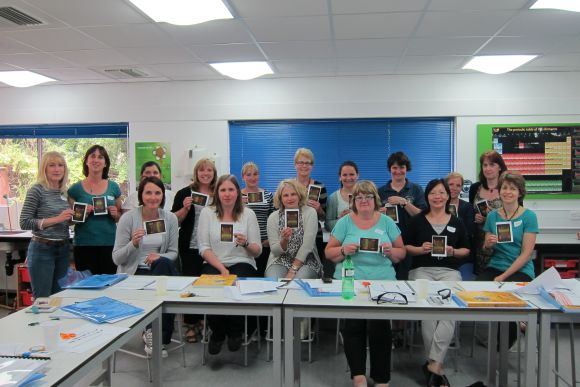Counting bubbles of oxygen to measure the rate of photosynthesis, estimating the population size of an organism using quadrats – these are some of the bioscience activities Karen Stephens remembers from when she was in secondary school. And despite the dramatic progress in biology over the past couple decades, in many places, these activities remain some of the only exposure UK students have to practical STEM work.
For Stephens, the course leader for ABE in the United Kingdom, seeing the transformation that happens when students supplement these old-school activities with more modern tools and techniques is the most exciting part of her work. “Watching the excitement, enjoyment and increased understanding of students using the current technologies and apparatus in the ABE kit and engaging with the scientific concepts behind the practical activities, never fails to thrill me,” she explains.
In honor of British Science Week this week, ABE spoke with Stephens about the UK program and her experience with STEM and biotechnology.
ABE: How did you personally become interested in science?
Stephens: I had an inspirational biology teacher when I was about 17 years old. When I first encountered genetics, I was fascinated about how such small molecules as nucleic acids are able to code so simply and elegantly for the variety of living organisms. I still find this incredible today.
ABE: What excites you most about biotechnology specifically?
Stephens: By manipulating biological molecules, I believe biotechnology has the potential to change lives, both individually through healthcare and at a societal level through development of environmentally friendly industrial advances. I am amazed by what we can do and wish to educate today’s students, who will become tomorrow’s innovators, so that they will consider the ethics of what they do too.
ABE: What have been some of your most memorable experiences with ABE so far?
Stephens: So many choices, I’ve pared it down to 3!
- The cheer of success when the teachers and technicians piloting the analytical PCR [polymerase chain reaction] linking genotype and phenotype from the bacterial transformation in the curriculum saw it work for the first time... I have a lovely picture of this cohort with their gel electrophoresis photos, showing the fantastic camaraderie, which I hold dear.
- The frisson of delight every time I look at gel electrophoresis of successful genetic engineering or the transformed bacteria glowing red on the UV transilluminator
- Presenting an assembly on genetic profiling whilst the ABE kit was in a school to a silent hall of students, then being inundated with extraordinarily insightful questions afterwards
ABE: Tell us more about the assembly and the types of questions the students asked.
Stephens: The assembly was centered around the UK scientist Alec Jeffreys [a geneticist who developed techniques now used worldwide in forensic science] and led to questions and discussions about: what he studied and career routes into biotechnology; whether DNA profiling works for identical twins; and the ethics of the UK DNA database and ruling from the European Court of Human Rights that those not convicted of crimes need to have their fingerprints removed from it.
ABE: Are there any particular challenges you are working to address with ABE that are specific to biotech in the United Kingdom or the region?
Stephens: Every year, we try to link practical activities and understanding to career opportunities in the biotech industry. With the rapid expansion of genomics as a field, it is hard to keep abreast of the many opportunities and find resources to explain career options in the field to students.
ABE: What are some of the greatest opportunities for biotechnology in the United Kingdom right now?
Stephens: One the biggest is the creation of a ‘golden triangle’ for biotechnology between Cambridge, Oxford, and London. The golden triangle initially described a group of elite, highly-funded universities located in those three cities, but is now increasingly being used to describe the growth of the biotech sector in these areas.
ABE: What are some recent biotech discoveries you are most excited to share with students there?
Stephens: In the UK, the Nuffield Council for Bioethics has been looking at the ethical and societal implications of our ability to manipulate genomes more simply, rapidly and cheaply using CRISPR. We wove this into our ABE training for teachers and technicians last year with both technical details and pedagogical suggestions of how to explore this with students. Several schools were intending to use the materials from the courses to extend their more able A level (17-18-year-old) students, especially those considering medical training. Initial feedback has been very positive.
ABE: Is there anything else you would like to add we didn’t get to?
Stephens: Despite being delivered in regions where the biotech industry is thriving (Cambridge and London), there is still very little opportunity for students to experience the practical side of molecular biology/biotechnology in schools and colleges before compulsory education finishes. I believe that the ABE program is invaluable as it offers students a real insight into how genetic manipulation is performed. With the rise of direct-to-consumer genetic testing, increasing importance of genomics in healthcare, and the desire to agree ethical guidelines on the use of new biotechnology, students need to understand this rapidly developing area, both for personal choice and global citizenship.
